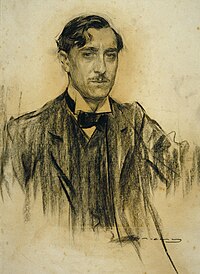Generación del 98
The Generación del 98 ( German Generation of 98 ) was a literary movement in Spain . The term goes back to Azorín , who used it in 1913 in the series of articles " La Generación de 1898 ".
Name of the movement
The name of the movement alludes to Spain's disastrous defeat in the Spanish-American War and the tense social and political situation that followed. On April 25, 1898, Spain declared war on the United States . The US was in the conflict over control of the remaining colonial areas of Spain and access to Asian markets through the Philippines. On May 1, 1898, the outdated Spanish fleet was completely destroyed by the US Asia Squadron in just a few hours in the Battle of Manila Bay. The war ended with the occupation of Cuba , Puerto Rico , Guams and the Philippines by the USA and for Spain with the loss of its last significant colonies .
Although the name was disapproved of by many writers of the era (including Pío Baroja ), it has become generally accepted. Common features of the writers of the Generación del 98 are roughly the same age (born around 1864 to 1875), similar biographies ( autodidacts ), interest in philosophy (especially Schopenhauer and Nietzsche ) and, above all, similar political views (often anarchist ideals ) in their youth ). Many authors were also linked through personal friendships and joint projects.
The Generación del 98 devoted itself in particular to an analysis of the reasons for the decline of Spain, which could no longer be glossed over since 1898. She tried to find ways out of the crisis through a spiritual reorientation of Spain towards Europe. An important aspect of this spiritual revival was the memory of the golden century of Spanish culture. Don Quixote , to whom Unamuno dedicated an essay, became a literary-symbolic key figure in the movement, which was partly still committed to late Romanticism and partly to Symbolism or Modernismo . But at the same time the conflict between the "Two Spain", the conflict of interest between the camps and the inner turmoil that would later lead to civil war can already be seen.
Members
Originally the group was formed from the Grupo de los Tres . It included Baroja, Azorín and Maeztu, who are also considered to be the most important representatives of the Generación del 98 . Also Joaquín Costa , Miguel de Unamuno , Jose Ortega y Gasset , Antonio Machado , Ramón del Valle-Inclán , Vicente Blasco Ibáñez , Ramón Menéndez Pidal and Gabriel Miró often belong to the group.
Parallel development in Venezuela
Under Spanish influence, a group around Pedro Emilio Coll (1872–1947), called the "Generation of 1898", was formed in Venezuela .
See also
- Generación del 37 (Argentina, 1837)
- Generación del 27 (Spain, 1927)

